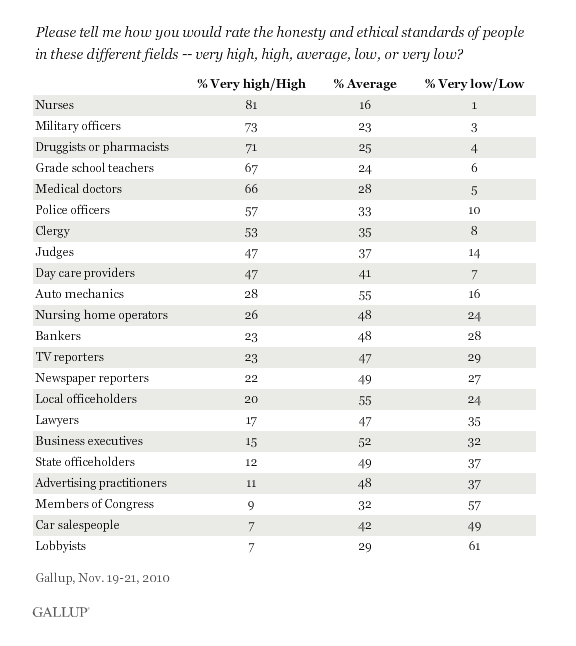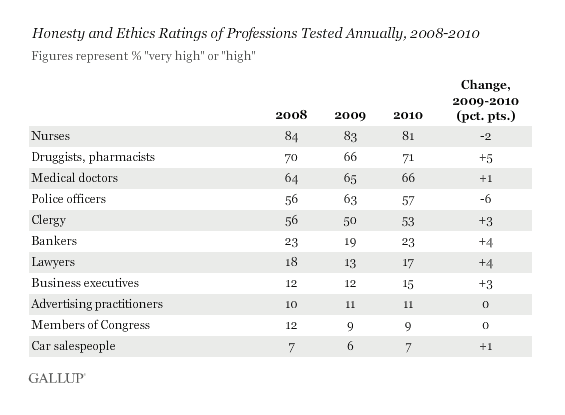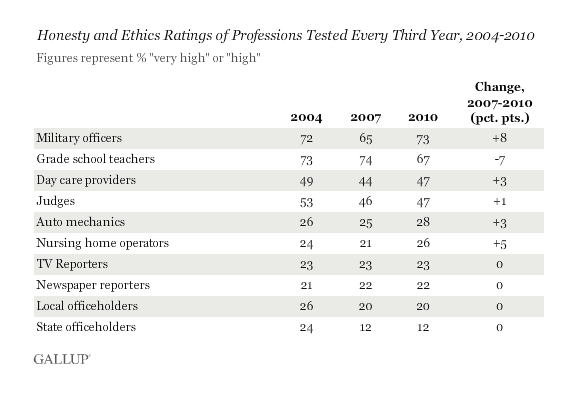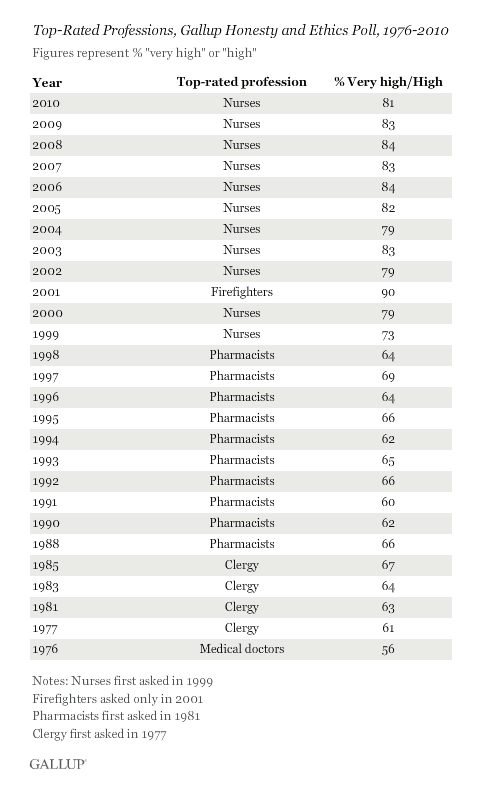News
Nurses Top Honesty and Ethics List for 11th Year
Nurses Top Honesty and Ethics List for 11th Year
Lobbyists, car salespeople, members of Congress get the lowest ratings
PRINCETON, NJ -- Nurses continue to outrank other professions in Gallup's annual Honesty and Ethics survey. Eighty-one percent of Americans say nurses have "very high" or "high" honesty and ethical standards, a significantly greater percentage than for the next-highest-rated professions, military officers and pharmacists. Americans rate car salespeople, lobbyists, and members of Congress as having the lowest honesty and ethics, with the last two getting a majority of "low" or "very low" ratings.
Gallup has asked Americans to rate the honesty and ethical standards of professions since 1976, and annually since 1991. Gallup first asked Americans to rate nurses in 1999, and that profession has topped the list since then in all but one year, 2001. Firefighters were added on a one-time basis in 2001 to test their image following reports of their heroism after the 9/11 terror attacks; they finished first, at 90%. Nurses still managed a strong 84% honesty and ethics rating that year, tying for their highest ever. Prior to 1999, clergy or pharmacists were usually the highest-rated professions. (For the list of top-rated professions by year, see page 2.)
There has been little meaningful change in the ratings of professions that are measured annually, compared with last year. To the extent there was change -- as in the case of pharmacists (+5), police officers (-6), bankers (+4), and lawyers (+4) -- the ratings have generally returned to the levels of two years ago.
The remaining professions tested this year (aside from lobbyists) were last measured in 2007. Americans rate two of these, military officers and nursing home operators, significantly more positively than in 2007, but not necessarily higher than in 2004. Honesty and ethics ratings of grade-school teachers are down significantly (from 74% in 2007 to 67% today); Gallup's only other measurement on that profession, from 2004 (73%), was also more positive than the current rating.
State officeholders' current 12% honesty and ethics rating is just one percentage point higher than its all-time low of 11% in 1977 and 1988, and remains down from its high of 24% in 2004.
Implications
Stability is generally the norm in Americans' ratings of the honesty and ethics of professions, but Americans' opinions do shift in response to real-world events, mostly scandals, that reflect poorly on a profession.
For example, bankers' ratings remain well below where they were before the financial crisis began (dropping from 35% in 2007 to 23% in 2008). Members of Congress' ratings have never been high, but their recent ratings rank among the worst in the more than 30-year history of Gallup's honesty and ethics question. Honesty and ethical ratings of the clergy remain depressed, compared with what they were prior to the Catholic priest sex-abuse revelations in the early 2000s.
The consistently most positively rated professions, including nurses and pharmacists, have generally been able to avoid widespread scandals and, as such, Americans continue to hold them in the highest regard.
Survey Methods
Results for this Gallup poll are based on telephone interviews conducted Nov. 19-21, 2010, with a random sample of 1,037 adults, aged 18 and older, living in the continental U.S., selected using random-digit-dial sampling.
For results based on the total sample of national adults, one can say with 95% confidence that the maximum margin of sampling error is ±4 percentage points.
Interviews are conducted with respondents on landline telephones (for respondents with a landline telephone) and cellular phones (for respondents who are cell phone-only). Each sample includes a minimum quota of 150 cell phone-only respondents and 850 landline respondents, with additional minimum quotas among landline respondents for gender within region. Landline respondents are chosen at random within each household on the basis of which member had the most recent birthday.
Samples are weighted by gender, age, race, education, region, and phone lines. Demographic weighting targets are based on the March 2009 Current Population Survey figures for the aged 18 and older non-institutionalized population living in continental U.S. telephone households. All reported margins of sampling error include the computed design effects for weighting and sample design.
In addition to sampling error, question wording and practical difficulties in conducting surveys can introduce error or bias into the findings of public opinion polls.
View methodology, full question results, and trend data.
For more details on Gallup's polling methodology, visit www.gallup.com.